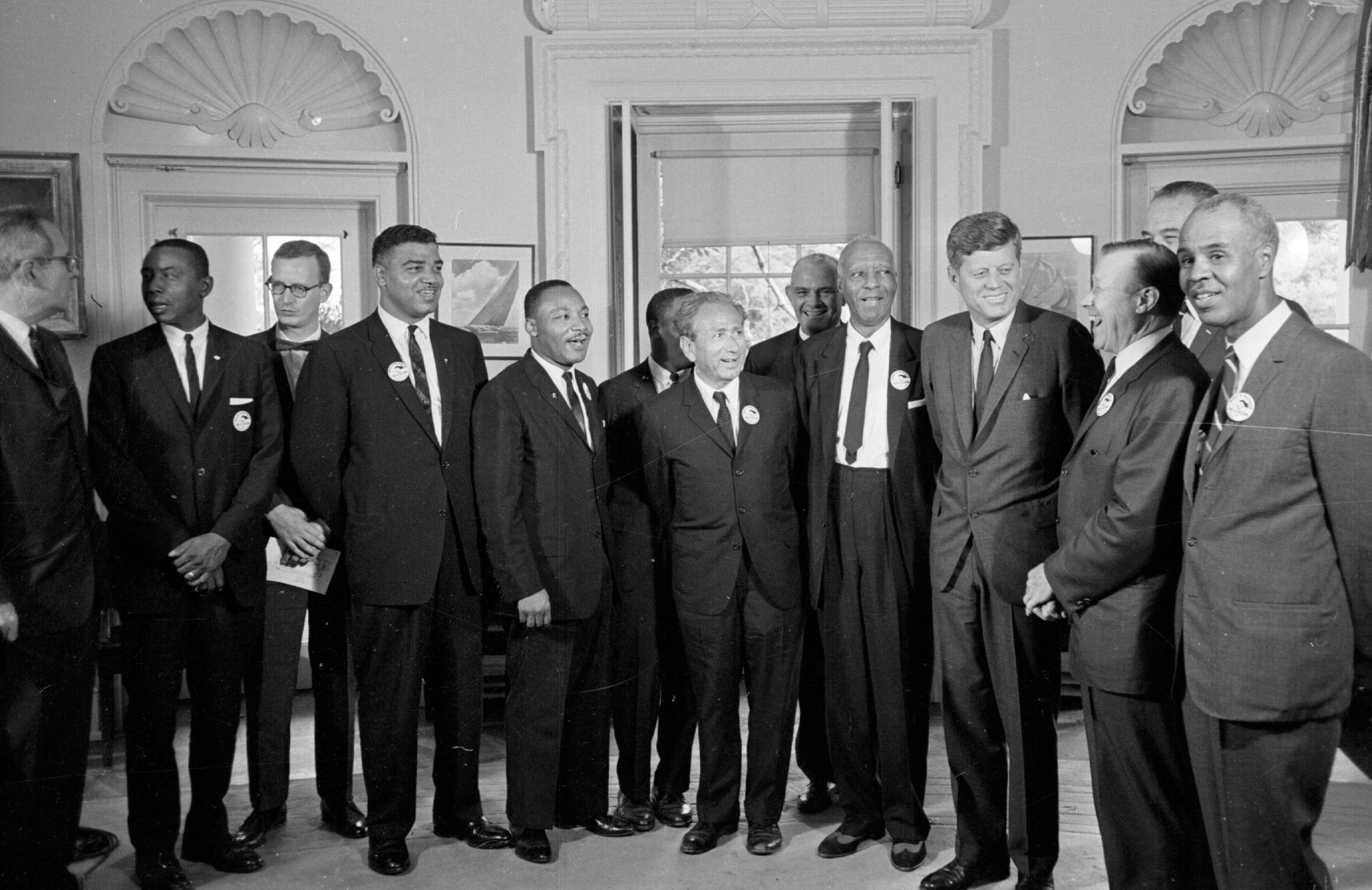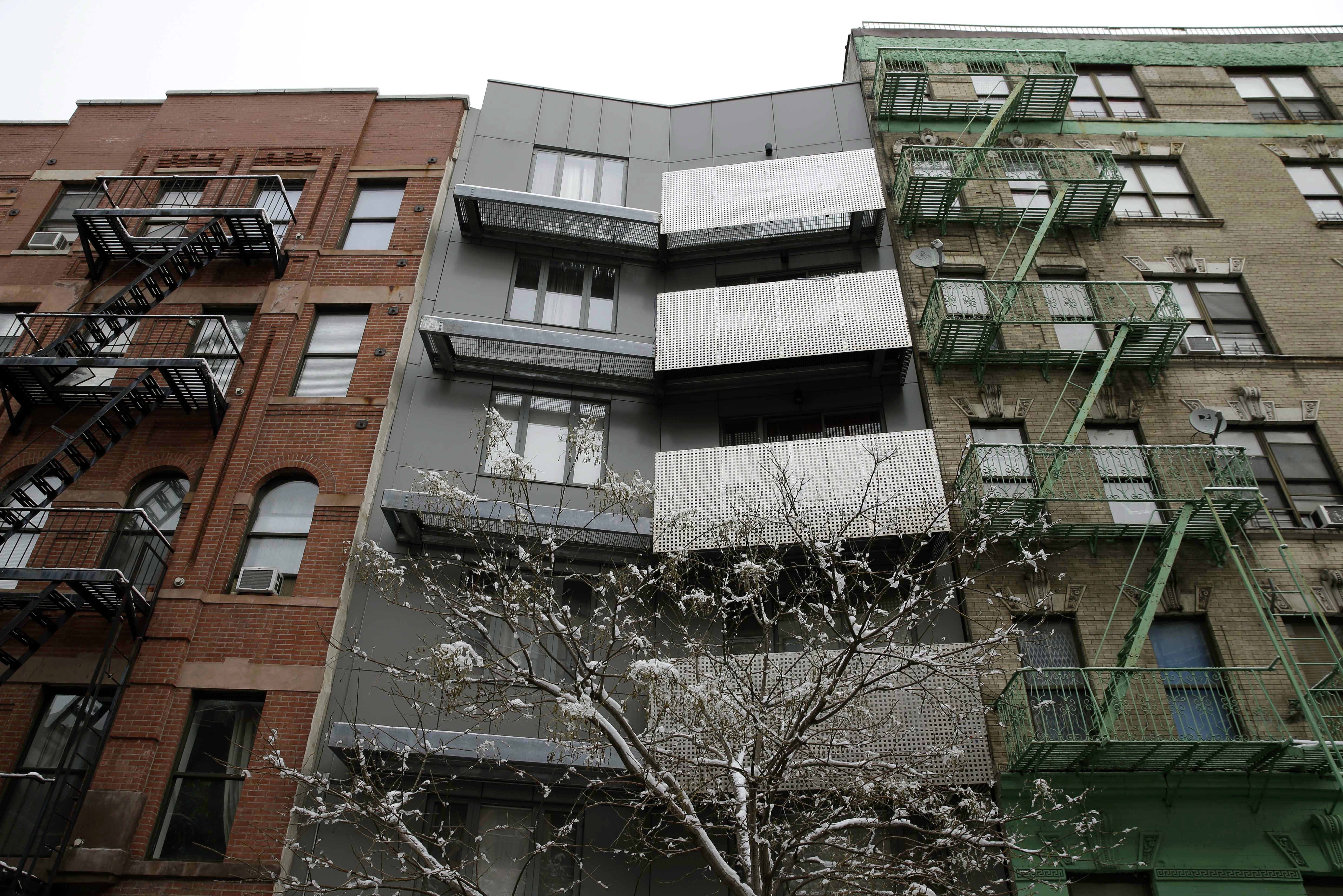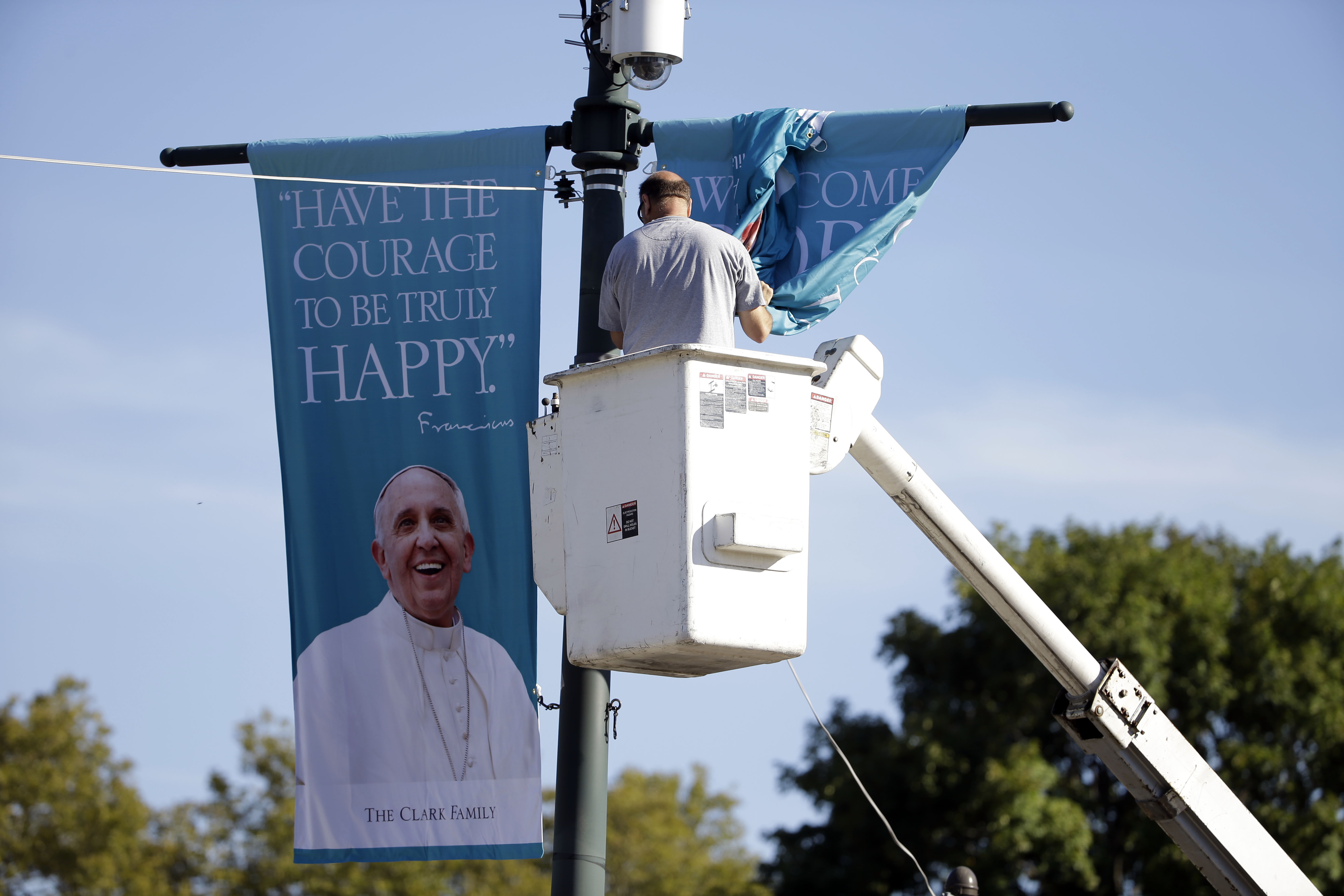
President John F. Kennedy stands with a group of leaders of the March on Washington at the White House. From left are Whitney Young, National Urban League; Martin Luther King Jr., Southern Christian Leadership Conference; John Lewis, Student Non-violent Coordinating Committee; Rabbi Joachim Prinz, American Jewish Congress; Dr. Eugene P. Donnaly, National Council of Churches; A. Philip Randolph, AFL-CIO vice president; Kennedy; Walter Reuther, United Auto Workers; Vice-President Johnson, rear, and Roy Wilkins, NAACP. (AP Photo)
If a nation has the ways and means to solve a social problem that is devastating millions of its citizens’ lives, but it fails to act, doesn’t that mean resolving the problem depends more on moral values than on coming up with new economic policies?
The social problem I am talking about is poverty. Poverty has always been an issue that’s been framed—one way or another—by morality. For those who view the poor with moral indignation, the solution is to enact policies designed to punish; and for those who apply empathy, the goal is to create programs that are geared to empower and uplift the poor.
What I perceive, based on personal experience—I’ve worked with many public and private groups on the issues of homelessness and poverty and I’ve experienced homelessness myself—is that one’s moral perspective on the poverty issue usually defines how one goes about finding and implementing solutions to it.
The dividing line seems to be whether you think poverty is caused by people lacking the basic resources they need in order to have stable families, good educational opportunities, and jobs; or, you think that people do not have these basic resources because they lack the personal attributes and social skills needed to earn them, as was implied by columnist David Brooks in a New York Times editorial last year.
I think it’s unfair to expect that people who don’t have access to basic needs—like adequate food, housing, and health care—should live normal and productive lives. To then punish them on top of that—by denying work and income supports, for example—is not only immoral, it’s irrational as well.
Early on in the battle to end poverty in America, the moral high ground was held by those with an empathic approach to alleviating poverty, in words and actions.
One’s moral perspective on the poverty issue usually defines how one goes about finding and implementing solutions to it.
President Roosevelt proclaimed: “The test of our progress is not whether we add more to the abundance of those who have much; it is whether we provide enough for those who have little.” He followed up those words with the New Deal, giving rise to Social Security and the modern liberal/progressive movement in America.
In his Inaugural Address in 1961, President Kennedy said: “If a free society cannot help the many who are poor, it cannot save the few who are rich.” He then announced a “New Frontier”: policies that extended jobless benefits, aid to children, increased Social Security and the minimum wage, and financed public affordable housing.
After Kennedy’s assassination, LBJ championed the Great Society and the War on Poverty: “… Neither you nor I are willing to accept the tyranny of poverty, nor the dictatorship of ignorance, nor the despotism of ill health, nor the oppression of bias and prejudice and bigotry. We want change. We want progress.” And he backed those words up with the Civil Rights Acts of 1964 and 1968, The Food Stamp Act of 1964, The Voting Rights Act of 1965, and the Housing and Urban Development Act of 1965.
In 1967, Martin Luther King wrote that “poverty has no justification in our age.” He compared it to “the practice of cannibalism at the dawn of civilization, when men ate each other because they had not yet learned” to produce their own food. “The time has come for us to civilize ourselves by the total, direct and immediate abolition of poverty.” He launched the Poor Peoples Campaign in 1968 to try to “gain economic justice for low-income people in the United States.” He was assassinated that year.
Bobby Kennedy took up the mantle as advocate for the poor and during his presidential campaign declared: “I believe that, as long as there is plenty, poverty is evil.” He, too, was assassinated—just two months after King.
Even President Nixon continued to build on many of these progressive policy reforms. In 1969 he called for “an end to hunger,” expanded the food stamp program, and then created the Supplemental Security Income (SSI) program in 1972.
I was born in the 1950s and lived through each of these periods of inspiration, hope and optimism; each were followed—inevitably, it came to seem—by death and anguish. The sudden, tragic loss of our most gifted and promising political and moral leaders left many in my generation traumatized and deeply scarred.
In the wake of the political carnage of the 1960s, and the national emotional hangover that only worsened with Vietnam and Watergate, Ronald Reagan came onto the national scene in the 1970s with openly racist disdain for the poor. His stump speeches included references to “welfare queens” taking “government handouts” while driving a “Cadillac”; and “strapping young bucks” using food stamps to buy “T-bone steaks.”
Does anyone think for a moment that if Bobby Kennedy, Martin Luther King, or Malcolm X were still alive then that they would have let him get away with that racist vitriol unchallenged? But Reagan did, and he backed up his words with actions.
Get Talk Poverty In Your Inbox
He took particular aim at programs and services that were effectively reducing poverty and preventing homelessness prior to his election. In his own version of a perfect storm for the poor, Reagan gutted the budget of Housing and Urban Development (HUD); discarded the Mental Health Systems Act of 1980, and as a result, scores of people suffering from mental illness became displaced, homeless, or incarcerated instead of receiving treatment in community mental health centers; and he changed the political narrative about poverty and homelessness—from one that acknowledged it as a national problem, to one that framed it as a matter of personal choice.
As President Reagan said in a 1984 interview with Good Morning America regarding the unprecedented surge in homelessness: “People who are sleeping on the grates…the homeless…are homeless, you might say, by choice.”
It’s a legacy we are still unable to escape more than a quarter century since he left office. How many of us liberal and progressive leaders are willing to take on Ronald Reagan’s view of America that has seeped so deeply into our national psyche?
I’ll start the dance. I’m a writer and David Brooks is a writer. So I’ll call him out. Your editorial in the NY Times that singled out single mothers as being one of the chief causes of poverty in America? The last thing a single mother needs is a lecture from you on the “cultural roots of the problem” of poverty that are “really the inescapable core of the thing.” What she really needs is a job that pays a wage that is sufficient to house and feed herself and her children; affordable quality childcare so she can work; and access to health care is probably a pretty damn good idea too.
If our current busting-at-the-seams economy can’t provide a living wage because it’s so grotesquely skewed to enhance the wealth of the already wealthy, then it’s our responsibility—as proudly empathic liberals and progressives—to force our politicians to enact programs that will protect, serve, and empower ALL of our citizens equally and together.













